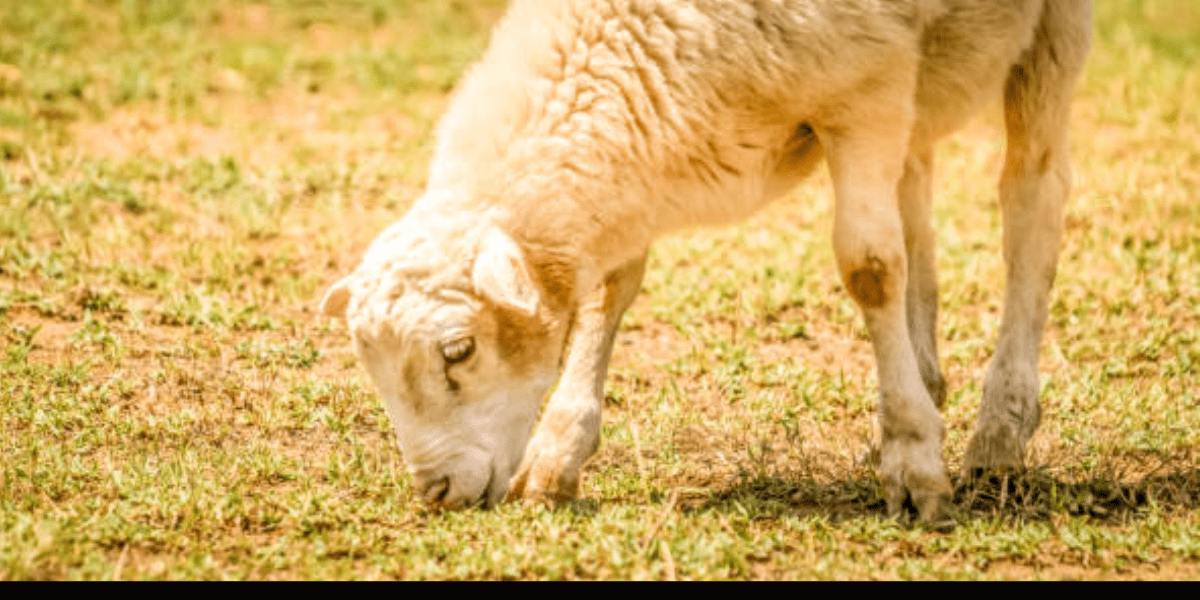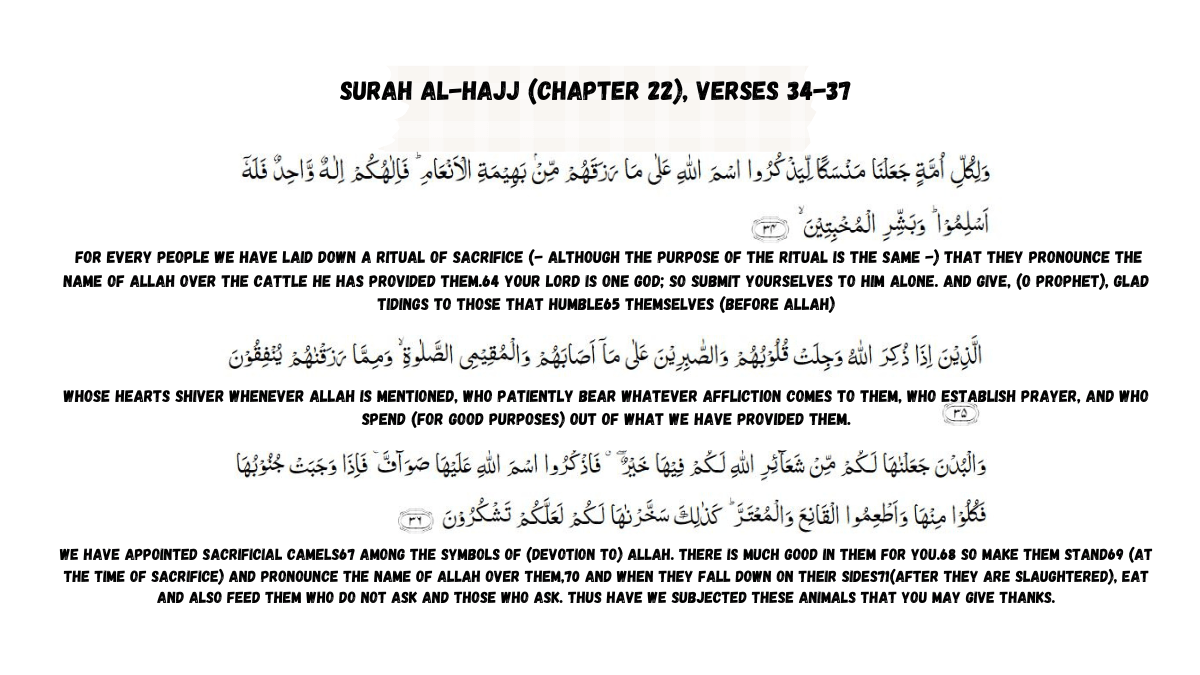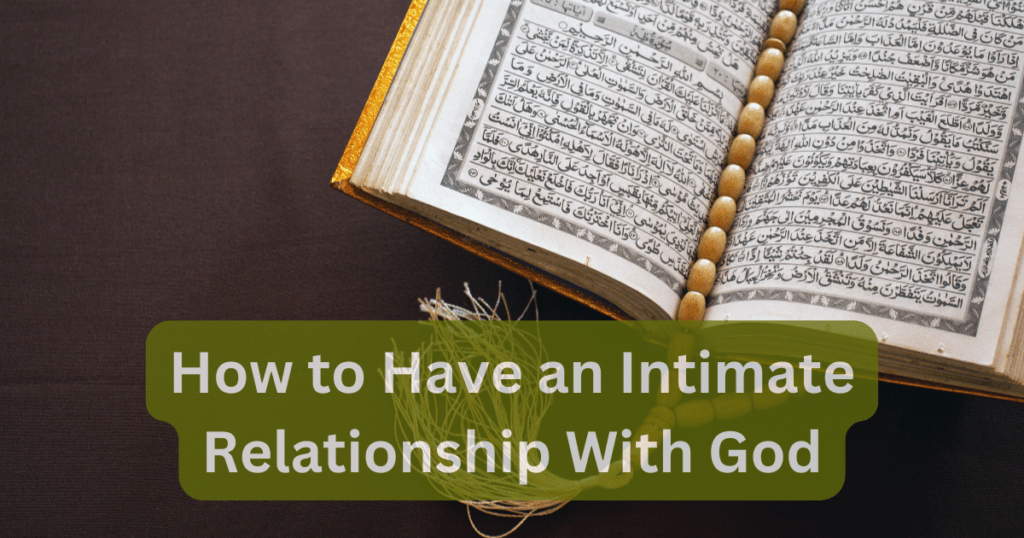
Introduction to Qurbani
Qurbani, also known as Udhiya, is a significant Islamic ritual performed during the festival of Eid al-Adha, the “Festival of Sacrifice.” This act of devotion commemorates the willingness of Prophet Ibrahim (Abraham) to sacrifice his son, Ismail, in obedience to God’s command. At the moment of sacrifice, God provided a ram to take Ismail’s place, demonstrating His mercy and the importance of faith and obedience.
Qurbani is not merely a historical event; it is a deeply spiritual practice that connects Muslims to their faith, community, and the values of charity and compassion. The act of Qurbani is performed by slaughtering a livestock animal—such as a sheep, goat, cow, or camel—during the days of Eid al-Adha. This sacrifice is not just a physical act but a manifestation of one’s submission to Allah and a reminder of the blessings and provisions bestowed by Him.
The roots of Qurbani trace back to one of the most profound narratives in Islamic tradition, highlighting themes of sacrifice, devotion, and divine intervention. Each year, millions of Muslims around the world participate in this ritual, reinforcing their spiritual beliefs and their connection to the global Muslim community (Ummah).
The practice of Qurbani is rich with symbolic meaning. It represents the willingness to give up something valuable for the sake of Allah, reflecting a Muslim’s readiness to put their faith above all else. The distribution of the meat from the sacrificed animal is also a crucial aspect of Qurbani, emphasizing the values of charity, kindness, and social responsibility. The meat is typically divided into three parts: one for the family, one for relatives and friends, and one for the needy. This act of giving ensures that the blessings of Eid al-Adha reach all layers of society, especially those less fortunate.
The ritual has evolved over centuries, adapting to different cultural and societal contexts while retaining its core significance. From the bustling streets of Cairo to the quiet villages in Indonesia, Qurbani is celebrated with a sense of unity and reverence. The methods and customs may vary, but the underlying principles of faith, sacrifice, and charity remain universal.
In this blog, we will delve deeper into the multifaceted aspects of Qurbani. We will explore its historical roots, its representation in the Quran and Hadith, and its spiritual and social implications. We will examine the ritualistic procedures, the ethical considerations regarding animal welfare, and the economic impact of this practice. Through personal stories and scholarly interpretations, we will gain a comprehensive understanding of what Qurbani means to Muslims around the world.
Significance of Qurbani in Islam
Qurbani, derived from the Arabic word “Qurban” which means an act performed to seek the pleasure of Allah, is an integral practice in Islam that carries significant spiritual, social, and ethical dimensions. Performed during the Islamic month of Dhul Hijjah, specifically on the 10th day, known as Eid al-Adha, and the following two days, Qurbani is a form of worship that mirrors the narrative of Prophet Ibrahim (Abraham) and his son, Ismail.
The origins of Qurbani lie in the profound story of sacrifice and submission, which is recounted in both the Qur’an and the Bible. According to Islamic tradition, Prophet Ibrahim, having demonstrated unwavering faith, was commanded by Allah in a dream to sacrifice his beloved son, Ismail. Ibrahim’s readiness to comply, and Ismail’s acceptance of Allah’s command, epitomize ultimate devotion and obedience. At the pivotal moment, Allah, in His infinite mercy, replaced Ismail with a ram, signifying that the act of intention and obedience was paramount.
The practice of Qurbani is not a mere ritual but a reenactment of this story, serving as a reminder of the values of faith, obedience, and submission to Allah’s will. Muslims worldwide participate in Qurbani as an expression of their faith and a reaffirmation of their spiritual commitments. The act of sacrifice involves the slaughtering of permissible livestock animals, such as sheep, goats, cows, and camels, following specific guidelines to ensure the process is humane and aligned with Islamic principles.
Qurbani is imbued with deep spiritual significance. It is an opportunity for Muslims to purify their intentions, reaffirm their devotion to Allah, and reflect on the virtues of selflessness and generosity. The act symbolizes the willingness to give up something cherished for the sake of Allah, mirroring Ibrahim’s willingness to sacrifice his son. It also reinforces the understanding that Allah is the ultimate provider, and everything a believer possesses is a blessing from Him.
Furthermore, Qurbani has substantial social implications. The distribution of the meat from the sacrificed animal is a critical aspect of the practice, highlighting the principles of charity and social justice in Islam. Traditionally, the meat is divided into three portions: one-third for the family, one-third for friends and relatives, and one-third for the less fortunate. This division ensures that the blessings of Eid al-Adha are shared widely, fostering a sense of community and caring for the needy.
The procedural aspect of Qurbani is meticulously detailed in Islamic jurisprudence. The selection of the animal, the method of slaughter, and the timing are governed by specific rules to ensure the act is performed in accordance with Islamic teachings. The animal must be healthy, free from defects, and of a certain age. The slaughtering process, known as Zabiha, requires the animal to be treated with kindness, minimizing its suffering, and ensuring the blood is fully drained to maintain the purity of the meat.
In contemporary times, the practice of Qurbani has adapted to various cultural and societal contexts while maintaining its core principles. In many communities, Qurbani is conducted collectively, with individuals contributing financially to the purchase and slaughter of animals. This collective approach not only makes the practice more accessible but also reinforces communal bonds and collective responsibility.
Qurbani is also viewed through the lens of modern ethical considerations, particularly concerning animal welfare. Islamic teachings emphasize compassion and mercy towards all living beings, and this extends to the treatment of animals during Qurbani. Ensuring that the animals are well cared for, minimizing their discomfort, and performing the slaughter with the utmost respect are crucial elements that reflect the ethical dimensions of the practice.
Historical Context and Origins
The historical context and origins of Qurbani are deeply intertwined with the story of Prophet Ibrahim (Abraham) and his son Ismail (Ishmael), a narrative that is central to Islamic tradition and also recognized in Judeo-Christian teachings. This story, which highlights the themes of faith, obedience, and divine intervention, lays the foundation for the practice of Qurbani as we know it today.
According to Islamic tradition, Prophet Ibrahim was a devout servant of Allah, known for his unwavering faith and dedication. He was tested by Allah with numerous trials, the most significant of which was the command to sacrifice his beloved son, Ismail. This command came to Ibrahim in a dream, which he recognized as a divine instruction. Despite the immense personal anguish this command entailed, Ibrahim resolved to fulfill Allah’s will, demonstrating his absolute submission and trust in God’s plan.
Ismail, embodying the same faith and obedience, accepted his fate without hesitation, reinforcing the virtues of submission and trust in divine wisdom. As Ibrahim prepared to carry out the sacrifice, Allah, in His infinite mercy, intervened and replaced Ismail with a ram, signifying that the test was not about the actual sacrifice but the willingness to obey and submit to God’s command.
This narrative is not only a cornerstone of Islamic faith but also a profound illustration of the principles that Qurbani embodies. The act of sacrifice, as performed during Eid al-Adha, is a symbolic reenactment of Ibrahim’s trial, reminding Muslims of the importance of faith, obedience, and the willingness to make personal sacrifices for the sake of Allah.
The practice of animal sacrifice predates Islam and was a common ritual in various ancient cultures and religions. However, in the Islamic context, Qurbani is unique in its spiritual significance and procedural guidelines. It was formalized as a key practice during the time of Prophet Muhammad (peace be upon him), who emphasized its importance and provided detailed instructions on how it should be performed.
Prophet Muhammad’s teachings on Qurbani are documented in numerous Hadiths, which are records of his sayings and actions. These Hadiths provide comprehensive guidelines on the selection of animals, the method of slaughter, and the distribution of meat. They underscore the principles of kindness towards animals, the importance of purity in the act of slaughter, and the social responsibility of sharing the meat with others, particularly the less fortunate.
The historical evolution of Qurbani reflects its adaptability to different cultural and societal contexts. Over the centuries, as Islam spread across diverse regions, the practice of Qurbani was integrated into various local traditions and customs. This resulted in a rich tapestry of practices and rituals that, while varying in their specifics, remain true to the core principles of Qurbani.
In many Muslim-majority countries, Qurbani is a communal event, often organized at mosques or community centers. Families and individuals contribute financially to the purchase of animals, which are then sacrificed collectively. This communal approach not only makes the practice more accessible but also fosters a sense of unity and shared purpose.
In modern times, the practice of Qurbani has also adapted to global economic and logistical realities. Many Muslims, particularly those living in urban areas or non-Muslim majority countries, participate in Qurbani through charitable organizations. These organizations facilitate the purchase and sacrifice of animals on behalf of donors, ensuring that the meat is distributed to those in need, both locally and globally. This approach not only maintains the spirit of Qurbani but also amplifies its charitable impact, reaching some of the most vulnerable communities around the world.
The historical and cultural evolution of Qurbani highlights its enduring relevance and significance in the lives of Muslims. It is a practice that transcends time and geography, connecting believers to their faith, their community, and the principles of charity and compassion. Through the practice of Qurbani, Muslims are reminded of the profound lessons from the story of Ibrahim and Ismail, and the timeless values of faith, obedience, and selflessness.
In this article, we have explored the historical context and origins of Qurbani, tracing its roots back to the story of Prophet Ibrahim and its evolution over centuries. In the following chapters, we will delve deeper into the various dimensions of Qurbani, including its representation in the Qur’an and Hadith, its procedural guidelines, and its spiritual and social implications. By understanding the historical foundations of Qurbani, we can appreciate its profound significance and its role in shaping the spiritual and social fabric of the Muslim community.
Qurbani in the Quran
The Quran, the holy book of Islam, serves as the primary source of guidance for Muslims in all aspects of life, including religious rituals and practices. The practice of Qurbani is deeply rooted in the teachings of the Qur’an, which recounts the story of Prophet Ibrahim (Abraham) and his willingness to sacrifice his son Ismail (Ishmael) in obedience to Allah’s command. This chapter explores the Qur’anic verses that relate to Qurbani and their significance in shaping the practice and understanding of this important ritual.
The story of Prophet Ibrahim and his son Ismail is narrated in Surah As-Saffat (Chapter 37) of the Qur’an. The verses describe Ibrahim’s vision, his readiness to fulfill Allah’s command, and the divine intervention that replaced Ismail with a ram. This story is central to the practice of Qurbani, as it exemplifies the principles of faith, obedience, and submission to Allah’s will.
In Surah As-Saffat, Verses 102-107, Allah Says:
The Holy Quran

"And when he [his son] was old enough to walk with him, he said, 'O my son, indeed I have seen in a dream that I [must] sacrifice you. So see what you think.' He said, 'O my father, do as you are commanded. You will find me, if Allah wills, of the steadfast.' And when they had both submitted and he put him down upon his forehead, We called to him, 'O Ibrahim, You have fulfilled the vision.' Indeed, We thus reward the doers of good. Indeed, this was the clear trial. And We ransomed him with a great sacrifice."
These verses highlight the key elements of the Qurbani narrative: the divine command, the willingness of both Ibrahim and Ismail to submit to Allah’s will, and the merciful substitution of a ram for Ismail. The story serves as a powerful reminder of the importance of faith and the rewards that come from sincere obedience to Allah.
The Quran also provides guidance on the broader significance and purpose of animal sacrifice. In Surah Al-Hajj (Chapter 22), verses 34-37, Allah discusses the practice of sacrifice as an act of devotion and a means of attaining piety:
In Surah Al-Hajj (Chapter 22), verses 34-37
The Holy Quran

"And for all religion We have appointed a rite [of sacrifice] that they may mention the name of Allah over what He has provided for them of [sacrificial] animals. For your god is one God, so to Him submit. And give good tidings to the humble [before their Lord]...Their meat will not reach Allah, nor will their blood, but what reaches Him is piety from you. Thus have We subjected them to you that you may glorify Allah for that [to] which He has guided you; and give good tidings to the doers of good."
These verses emphasize that the physical act of sacrifice is not the ultimate goal; rather, it is the piety and righteousness of the believer that are of paramount importance. The ritual of Qurbani is a means of demonstrating one’s devotion to Allah and expressing gratitude for His blessings. It is also an opportunity to reflect on the values of compassion, generosity, and social responsibility.
The Qur’an further underscores the importance of sharing the meat of the sacrificed animal with others, particularly those in need. This aspect of Qurbani reflects the broader Islamic principles of charity and community welfare. By distributing the meat, Muslims fulfill their duty to care for the less fortunate and strengthen the bonds of brotherhood and solidarity within the community.
In addition to these specific verses, the overall teachings of the Qur’an on compassion, mercy, and social justice are integral to the practice of Qurbani. The Qur’an repeatedly emphasizes the importance of helping those in need, showing kindness to animals, and acting with sincerity and humility in all acts of worship. These principles are embodied in the practice of Qurbani, making it a profound expression of faith and a means of attaining spiritual and moral growth.
In summary, the Qur’anic teachings on Qurbani provide a comprehensive framework for understanding the significance and purpose of this ritual. The story of Prophet Ibrahim and Ismail serves as a powerful reminder of the values of faith, obedience, and submission to Allah’s will. The guidance on the proper conduct of the sacrifice and the emphasis on piety and charity highlight the deeper spiritual and social dimensions of Qurbani. By reflecting on these teachings, Muslims can appreciate the profound significance of Qurbani and its role in enhancing their relationship with Allah and their community.
The Hadiths on Qurbani
Hadiths, the recorded sayings and actions of Prophet Muhammad (peace be upon him), provide valuable insights and detailed guidance on the practice of Qurbani. These narrations complement the teachings of the Qur’an and offer practical instructions on how to perform the ritual in accordance with Islamic principles. This chapter explores the key Hadiths related to Qurbani, highlighting their significance in shaping the understanding and implementation of this important practice.
One of the most frequently cited Hadiths on Qurbani is narrated by Anas ibn Malik, who reported that the Prophet Muhammad said:
"Whoever can afford it but does not offer a sacrifice, let him not approach our place of prayer."
This Hadith underscores the importance of performing Qurbani for those who have the financial means to do so. It emphasizes that Qurbani is not just a recommended act but an essential aspect of celebrating Eid al-Adha and demonstrating gratitude to Allah. The strong language used in this Hadith indicates the high value placed on Qurbani as a means of worship and a communal obligation.
Another significant Hadith related to Qurbani is narrated by Aisha, the wife of the Prophet Muhammad (PBUH), who reported that the Prophet said:
"There is nothing dearer to Allah during the days of Qurbani than the sacrificing of animals. The sacrificed animal shall come on the Day of Judgment with its horns, hair, and hooves (to be weighed). The sacrifice is accepted by Allah before the blood reaches the ground. Therefore, sacrifice with an open and happy heart."
This Hadith highlights the spiritual significance of Qurbani and the pleasure it brings to Allah. It also reassures believers that their sacrifice will be rewarded in the Hereafter, emphasizing the importance of performing the ritual with sincerity and joy. The imagery of the sacrificed animal coming on the Day of Judgment serves as a powerful reminder of the lasting impact of sincere acts of worship.
The Prophet Muhammad also provided specific instructions on the selection and treatment of the animals used for Qurbani. In a Hadith narrated by Al-Bara bin Azib, the Prophet said:
"Four are not permissible for sacrifice: the one-eyed animal whose defect is obvious, the sick animal whose sickness is obvious, the lame animal whose lameness is obvious, and the emaciated animal that no one would choose."
This Hadith establishes clear guidelines on the physical condition of the animals to be sacrificed, ensuring that only healthy and wholesome animals are offered. This not only reflects the importance of maintaining high standards in worship but also demonstrates compassion and respect for the animals involved.
In another Hadith, the Prophet Muhammad (PBUH) emphasized the humane treatment of animals during the sacrifice. Ibn Abbas reported that the Prophet said:
"Do not sharpen your knives in front of the animal, and do not slaughter one animal in front of another."
This Hadith highlights the ethical considerations involved in Qurbani, instructing believers to minimize the suffering and distress of the animals. It reflects the broader Islamic principles of kindness and mercy towards all living beings.
The Hadiths also provide guidance on the distribution of the meat from the sacrificed animals. In a Hadith narrated by Abdullah ibn Amr, the Prophet Muhammad said:
"The best of deeds on the day of Eid al-Adha is to shed blood (of the sacrificial animal). But in the meat of the sacrifice, one-third for you, one-third for your family, and one-third for the poor."
This Hadith outlines the recommended distribution of the meat, ensuring that the benefits of Qurbani are shared with the family, friends, and the less fortunate. This practice reinforces the principles of charity and social responsibility, integral to the spirit of Qurbani.
Through these Hadiths, we gain a comprehensive understanding of the various aspects of Qurbani, from the selection and treatment of animals to the distribution of meat. The teachings of the Prophet Muhammad provide detailed guidance on performing Qurbani in a manner that aligns with Islamic values and principles. They emphasize the importance of sincerity, compassion, and generosity, making Qurbani a profound act of worship that benefits both the individual and the community.
In summary, the Hadiths on Qurbani offer valuable insights into the practical and ethical dimensions of this important practice. They complement the teachings of the Qur’an and provide detailed instructions on how to perform Qurbani with sincerity and compassion. By following these teachings, Muslims can ensure that their Qurbani is not only a physical act of sacrifice but also a meaningful expression of their faith and devotion to Allah.
In summary, Qurbani is a rich and multifaceted practice that embodies the spiritual, social, and ethical teachings of Islam. It is a profound act of worship that connects Muslims to their faith, reinforces their commitment to Allah, and underscores the values of charity and compassion. Through the chapters of this book, we will explore the various dimensions of Qurbani, delving into its historical roots, its representation in Islamic texts, and its relevance in the modern world. By understanding the depth and breadth of this practice, we can appreciate its enduring significance in the lives of Muslims around the globe.
FAQ: The Spiritual Significance of Qurbani in Islam
Q: What is the spiritual significance of Qurbani in Islam?
A: Qurbani holds profound spiritual significance in Islam as it commemorates the willingness of Prophet Ibrahim (Abraham) to sacrifice his son Ismail in obedience to Allah’s command. This act of submission and devotion serves as a powerful reminder of the importance of faith, obedience, and trust in Allah’s will. Muslims perform Qurbani during the annual Eid al-Adha festival to emulate the example of Prophet Ibrahim and to express their gratitude and submission to Allah.
Q: How does Qurbani deepen one’s faith?
A: Qurbani deepens one’s faith by reinforcing key Islamic values such as sincerity, sacrifice, and submission to Allah. By willingly sacrificing a portion of their wealth, Muslims demonstrate their commitment to obeying Allah’s commands and their trust in His providence. Through the act of Qurbani, believers strengthen their faith and cultivate a deeper connection to their Creator.
Q: What spiritual lessons can be learned from Qurbani?
A: Qurbani teaches several important spiritual lessons, including:
- Submission to Allah: Like Prophet Ibrahim, Muslims are reminded of the importance of submitting to Allah’s will, even in the face of difficulty or uncertainty.
- Gratitude and Contentment: Qurbani encourages believers to be grateful for the blessings they have been given and to share them with others, fostering a sense of contentment and generosity.
- Compassion and Empathy: The act of sacrificing an animal for Qurbani instills compassion and empathy for all of Allah’s creation, reinforcing the importance of kindness and mercy towards others.
- Renewal of Faith: Qurbani offers believers an opportunity to renew their faith and devotion to Allah, strengthening their spiritual connection and sense of purpose.
Q: How does Qurbani promote spiritual growth?
A: Qurbani promotes spiritual growth by encouraging self-reflection, humility, and service to others. Through the act of sacrifice, Muslims are reminded of the transient nature of worldly possessions and the eternal significance of their relationship with Allah. By performing Qurbani with sincerity and devotion, believers experience spiritual growth and a deeper connection to their faith.
Q: Is Qurbani obligatory for all Muslims?
A: Qurbani is not obligatory for all Muslims but is highly recommended for those who can afford it. It is considered a Sunnah Mu’akkadah (confirmed tradition) for those who possess the financial means to do so. However, it is not obligatory for individuals who are in debt or experiencing financial hardship.
Q: How can one ensure that their Qurbani is spiritually fulfilling?
A: To ensure that Qurbani is spiritually fulfilling, Muslims should:
- Perform the sacrifice with sincerity and devotion, intending to please Allah and follow the example of Prophet Ibrahim.
- Follow the proper Islamic guidelines for selecting, slaughtering, and distributing the sacrificial animal.
- Reflect on the spiritual significance of Qurbani and the lessons it imparts about faith, obedience, and gratitude.
- Share the meat with family, friends, and those in need, fostering a sense of community and generosity.
- Engage in acts of worship and remembrance during the Eid al-Adha festivities, deepening their spiritual connection to Allah.
By approaching Qurbani with reverence and mindfulness, believers can ensure that it becomes a spiritually enriching experience that strengthens their faith and devotion to Islam.



